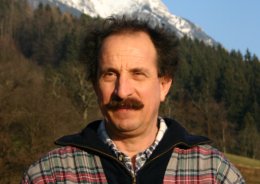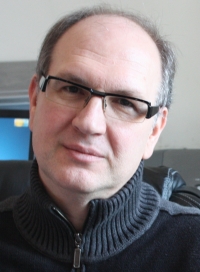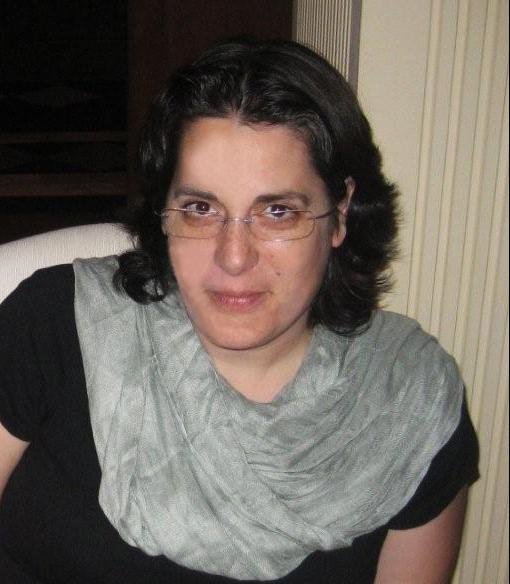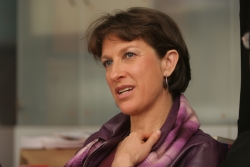 Tonci Kuzmanic is Founding member of the Peace Institute in Ljubljana. He is professor at the University of Primorska (Koper) teaching political science, sociology, and ethics in management. During the last few years he has been mainly researching in the field of critique of management in the post-socialist circumstances and globalisation. For more than decade he was a peace activist and researcher in the field of peace, mainly targeting war in Yugoslavia, violence, hate-speech, racism and politics (anti-politics). His most recent books from this field were Hate-speech in Slovenia (2002), "Media, politics" (Peace institute, 2005). His recent articles approach war in Iraq and Afganistan. His published other books and articles in recent years, including "Managerial discourse" (Koper, FM, 2007), "Critique of P. F. Drucker and managerial paradigm" (MI, 2008) and "Management and politics" (in Biloslavo, FM, KP, 2008). A study of his research team, dedicated to the "Critique of managerial revolution" will shortly appear in Casopis za kritiko znanosti. Kuzmanic is also a lecturer at the post-graduate study Institutum Studiorum Humanitatis in Ljubljana, founder of Workers-Punk University (Ljubljana) and To Lykeinon (Koper), where he is teaching a course "Karl Marx and understanding of our time." He is leading three additional research and reading circles, "Understanding of Martin Heidegger", "Reading Aristotle" and "Analysis of USA and managerial revolution" and is currently preparing a book about capitalism, post-capitalism and managerial revolution.
Tonci Kuzmanic is Founding member of the Peace Institute in Ljubljana. He is professor at the University of Primorska (Koper) teaching political science, sociology, and ethics in management. During the last few years he has been mainly researching in the field of critique of management in the post-socialist circumstances and globalisation. For more than decade he was a peace activist and researcher in the field of peace, mainly targeting war in Yugoslavia, violence, hate-speech, racism and politics (anti-politics). His most recent books from this field were Hate-speech in Slovenia (2002), "Media, politics" (Peace institute, 2005). His recent articles approach war in Iraq and Afganistan. His published other books and articles in recent years, including "Managerial discourse" (Koper, FM, 2007), "Critique of P. F. Drucker and managerial paradigm" (MI, 2008) and "Management and politics" (in Biloslavo, FM, KP, 2008). A study of his research team, dedicated to the "Critique of managerial revolution" will shortly appear in Casopis za kritiko znanosti. Kuzmanic is also a lecturer at the post-graduate study Institutum Studiorum Humanitatis in Ljubljana, founder of Workers-Punk University (Ljubljana) and To Lykeinon (Koper), where he is teaching a course "Karl Marx and understanding of our time." He is leading three additional research and reading circles, "Understanding of Martin Heidegger", "Reading Aristotle" and "Analysis of USA and managerial revolution" and is currently preparing a book about capitalism, post-capitalism and managerial revolution.


 Orli Fridman is the Academic Director of the SIT Study Abroad Program in the Balkans (Post-conflict transformation in Serbia, Bosnia and Croatia) and a lecturer at the MA program in Conflict Studies at the Faculty of Media and Communications (FMK) at Belgrade's Singidunum University. Orli received her Ph.D. at the Institute for Conflict Analysis and Resolution (ICAR) at George Mason University (2006). She holds a B.A. in Political Science and Middle Eastern Studies from the Hebrew University in Jerusalem and an M.A. in History of the Middle East from Tel Aviv University. Since 1994, Orli has been involved in political education. She was trained as a facilitator for groups in conflict and worked with groups from Israel-Palestine, Northern Ireland, Cyprus, and the successor states of the former Yugoslavia. Her Recent publications include: ‘Alternative Voices in Public Urban Space: Serbia's Women in Black (Ethnologia Balkanica 10, 2006); 'Breaking States of Denial: Anti-Occupation Activism in Israel after 2000' (Genero 10/11, 2007); Forthcoming: ‘It Was Like Fighting a War with Our Own People: Anti-War Activism in Serbia during the 1990's' and ‘(Re)Centring Europe: Competing Israeli and Palestinian Narratives in the Shadow of Europe' (co-authored).
Orli Fridman is the Academic Director of the SIT Study Abroad Program in the Balkans (Post-conflict transformation in Serbia, Bosnia and Croatia) and a lecturer at the MA program in Conflict Studies at the Faculty of Media and Communications (FMK) at Belgrade's Singidunum University. Orli received her Ph.D. at the Institute for Conflict Analysis and Resolution (ICAR) at George Mason University (2006). She holds a B.A. in Political Science and Middle Eastern Studies from the Hebrew University in Jerusalem and an M.A. in History of the Middle East from Tel Aviv University. Since 1994, Orli has been involved in political education. She was trained as a facilitator for groups in conflict and worked with groups from Israel-Palestine, Northern Ireland, Cyprus, and the successor states of the former Yugoslavia. Her Recent publications include: ‘Alternative Voices in Public Urban Space: Serbia's Women in Black (Ethnologia Balkanica 10, 2006); 'Breaking States of Denial: Anti-Occupation Activism in Israel after 2000' (Genero 10/11, 2007); Forthcoming: ‘It Was Like Fighting a War with Our Own People: Anti-War Activism in Serbia during the 1990's' and ‘(Re)Centring Europe: Competing Israeli and Palestinian Narratives in the Shadow of Europe' (co-authored).
 Tonci Kuzmanic is Founding member of the Peace Institute in Ljubljana. He is professor at the University of Primorska (Koper) teaching political science, sociology, and ethics in management. During the last few years he has been mainly researching in the field of critique of management in the post-socialist circumstances and globalisation. For more than decade he was a peace activist and researcher in the field of peace, mainly targeting war in Yugoslavia, violence, hate-speech, racism and politics (anti-politics). His most recent books from this field were Hate-speech in Slovenia (2002), "Media, politics" (Peace institute, 2005). His recent articles approach war in Iraq and Afganistan. His published other books and articles in recent years, including "Managerial discourse" (Koper, FM, 2007), "Critique of P. F. Drucker and managerial paradigm" (MI, 2008) and "Management and politics" (in Biloslavo, FM, KP, 2008). A study of his research team, dedicated to the "Critique of managerial revolution" will shortly appear in Casopis za kritiko znanosti. Kuzmanic is also a lecturer at the post-graduate study Institutum Studiorum Humanitatis in Ljubljana, founder of Workers-Punk University (Ljubljana) and To Lykeinon (Koper), where he is teaching a course "Karl Marx and understanding of our time." He is leading three additional research and reading circles, "Understanding of Martin Heidegger", "Reading Aristotle" and "Analysis of USA and managerial revolution" and is currently preparing a book about capitalism, post-capitalism and managerial revolution.
Tonci Kuzmanic is Founding member of the Peace Institute in Ljubljana. He is professor at the University of Primorska (Koper) teaching political science, sociology, and ethics in management. During the last few years he has been mainly researching in the field of critique of management in the post-socialist circumstances and globalisation. For more than decade he was a peace activist and researcher in the field of peace, mainly targeting war in Yugoslavia, violence, hate-speech, racism and politics (anti-politics). His most recent books from this field were Hate-speech in Slovenia (2002), "Media, politics" (Peace institute, 2005). His recent articles approach war in Iraq and Afganistan. His published other books and articles in recent years, including "Managerial discourse" (Koper, FM, 2007), "Critique of P. F. Drucker and managerial paradigm" (MI, 2008) and "Management and politics" (in Biloslavo, FM, KP, 2008). A study of his research team, dedicated to the "Critique of managerial revolution" will shortly appear in Casopis za kritiko znanosti. Kuzmanic is also a lecturer at the post-graduate study Institutum Studiorum Humanitatis in Ljubljana, founder of Workers-Punk University (Ljubljana) and To Lykeinon (Koper), where he is teaching a course "Karl Marx and understanding of our time." He is leading three additional research and reading circles, "Understanding of Martin Heidegger", "Reading Aristotle" and "Analysis of USA and managerial revolution" and is currently preparing a book about capitalism, post-capitalism and managerial revolution.